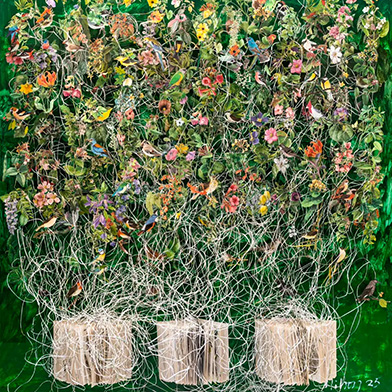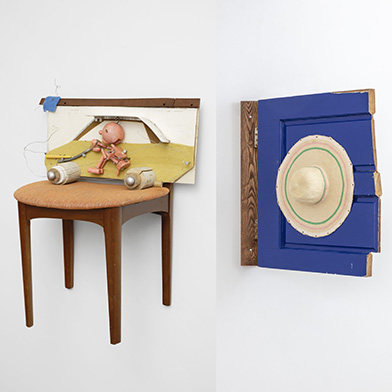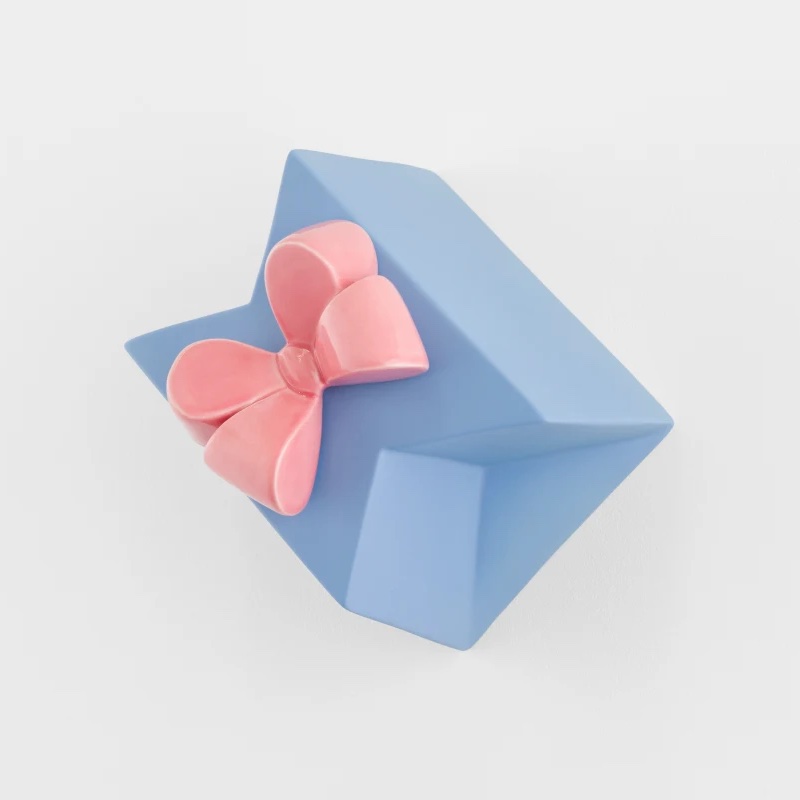Trained as an academic painter, Július Koller began to take a critical stance in his days as a student. Inspired by Duchamp, Fluxus and Nouveau Réalisme he began using Conceptual techniques and his dry wit to question the Western art world and to skilfully comment on Communist Czechoslovakia where cultural production was divided into ‘official’ and so-called ‘free art’.
In the mid 1960s Koller made the ‘Antihappening’ a fundamental statement throughout his whole artistic career. The prefix ‘anti’ was a way of distinguishing his work from all artistic actions that follow some kind of script and distributed in telegrams, postcards, and declared in his manifestos.
The Junk Culture series consisted of collecting the detritus left from the act of painting; waste paints, paper palettes or mixing bowls, as well as books, posters, and wrappers to create simple minimal collage compositions. Koller related the junk series to how he perceived his personal situation, as he felt he had spent his whole life in the midst of culture of junk as well as interrogating the new culture of Consumerism.
From 1969 onward, the question mark became Július Koller’s signature, subject, and medium. He defined himself through it, transforming both his identity and art into symbols of doubt, inquiry, and uncertainty. In 1970, two years after the suppression of a potential third path of socialism in the ČSSR, Koller introduced the concept of U.F.O.—Universal- Cultural Futurological Operations. Over the next three decades, this became the title of his major body of work, with Koller himself becoming part of the U.F.O. project. The idea of extraterrestrial craft served as a metaphor for his personal engagement in shaping cultural realities. With U.F.O., Koller created a complex system of references that framed his entire practice. Science fiction, for him, offered a vision of the future and a means to reimagine the present through imagination.
The obsessive and mass documentation Self-Chronology became a lifelong undertaking, acquiring and classifying the visual and textual evidence of the socialist and post-socialist worlds he inhabited. Constantly organising and manipulating, he systematically responded to the reality around him. Text collages, letters, notebooks, and transcriptions form an integral part of the archive, amongst them important texts of the Western neo-avant-garde. Koller’s archive is not just the source of his artistic œuvre but also an integral part of it.
The highlight of the exhibition is the large installation Big U.F.O. (1995), originally exhibited at Bratislava’s House of Art, a large sheet of hardboard is suspended in a net, hovering horizontally above the ground challenging the idea of traditional paintings. The painted zig-zag net motif references both the Slovak national symbol of three hills and the swastika. These mystical symbols appeared frequently in Koller’s work during a period marked by rising nationalism and growing uncertainty around Slovakia’s young democracy.
Since the rediscovery of his work in the early 1990s by Slovak artists and intellectuals, Július Koller has become an iconic figure in the history of the neo-avant-garde and post-avant-garde and an important inspiration for artists worldwide whilst his work provides a fascinating documentation and critique of both sides of the Iron Curtain.
Koller exhibited regularly both in Slovakia and internationally including Sao Paulo, New York, and New Zealand with recent solo shows Július Koller, One Man Anti Show, at the MUMOK, Vienna, travelling to MUSEION, Bozen in 2016, Museum of Contemporary Art, Zagreb (2019), Museum of Modern Art, Warsaw (2015) and group shows at Museum of Contemporary Art, Tokyo, (2017) and Centre Pompidou, Paris (2020) and Les Abattoirs, Toulouse (2024). Works are in the collections of Tate Modern, London, Centre Pompidou, Paris, MoMA, New York, Slovak National Gallery, National Gallery, Prague amongst many others.
all images © the gallery and the artist(s)



